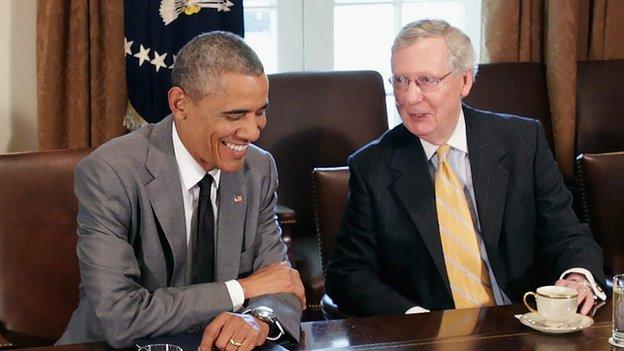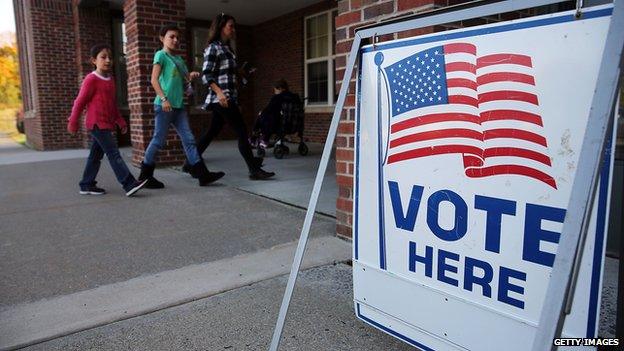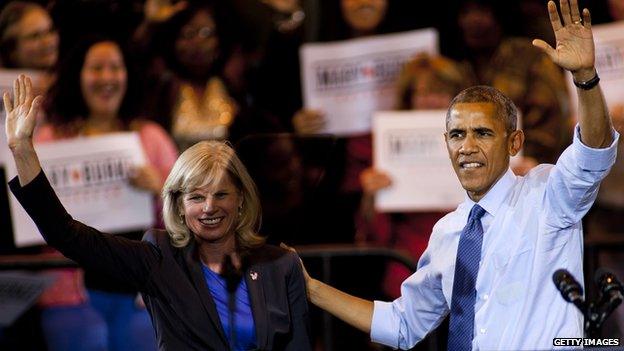US mid-terms: Obama and McConnell face new power balance
- Published
- comments

Both men say they are open to compromise
For all the talk that it was too close to call, it was going down to the wire, it was on a knife's edge, and every other cliche that is in the political journalist's rather limited lexicon, it wasn't. Not at all.
The Republicans won. And won big. They picked up seats on the East Coast, in middle America, in the deep South, in the West. They got the keys to several governors' mansions in victories that were as unexpected as they were welcome. Their majority in the House of Representatives increased.
If this were basketball, then we'd be saying they had a slam dunk of a night
That leaves one man waking up this morning with a lot more power than he has ever wielded before, but with the potential to trip. And it leaves one man still with a huge amount of power, but also a pretty big headache.
The man with the newly found power is Mitch McConnell, the presumptive next Senate majority leader, and victor last night in his native Kentucky; the man reaching for the Advil is Barack Obama.
US Mid-terms: Exit polls
What voters told the pollsters
45%
Said the economy was the top priority
34%
Voted to show opposition to President Obama
-
57% Over-65s voted Republican and they represented 22% of all voters
-
64% Non-white college graduates supported the Republicans
-
89% Black voters and 63% Hispanic voters backed the Democrats
To the victor the spoils, so let us first consider the challenges facing Mr McConnell.
The Republicans now have a majority in both houses of Congress. They have inflicted a bloody nose on Barack Obama in particular, and on the Democratic Party in general. They will be able to pass legislation the president must either sign or veto. So far, so good.
But there are buts.
For a start, this was a victory based much more on the American people's disillusionment with the president than a distinctive agenda painted by the Republicans. There was no Contract With America that the voters were asked to endorse.
Mr Obama's unpopularity in the run-up to these mid-term elections is hard to exaggerate. One of the things that is lost in the big picture of the night is some of the sidebar poll findings - the American people are fed up with all their politicians. It's not just the occupant of the White House, though as Harry Truman most famously noted, the buck stops with the president.
Mr McConnell will be conscious of that and will know that in two years' time, when it is not just the Senate but the presidency in play, the American people could be venting their spleen on him. Be fearful of the blame game.
That leaves the Kentucky senator with some important tactical decisions to make.

Unhappy voters

National exit polls taken of Election Day voters show an electorate unhappy with the president - and the opposing party.
59% are dissatisfied or angry with the Obama administration
60% are dissatisfied or angry with the Republican leaders in Congress
53% have an unfavourable opinion of the Democratic Party
54% have an unfavourable opinion of the Republican Party

When we saw him in Kentucky a few days ago Mr McConnell said that if he became majority leader it was up to the president to compromise.
If that happened, he told us, then they would be able to do business together. But of course, the Republicans will have to give some ground too. There are any number of issues where with good will and a sense of compromise, progress could be made.
How about the Keystone oil pipeline from Canada, corporate tax reform, immigration reform? They are all areas ripe for progress. But will the now six-term senator be able to carry his senators with him in this pursuit?
The past two years have been marked by the most terrible relations between the Republicans and the White House - just think of the government shutdown, which was widely perceived as the Republicans over-reaching themselves. What is to stop the same thing happening again?
After all, Mr McConnell is not some genial old shepherd leading his docile sheep to new grazing grounds. His flock are quarrelsome, ideologically driven and they might not want to listen.
Add to that the presidential ambitions of a number of his senators, which means they will be spending little time in Washington waiting for votes, and it is questionable how robust that majority in the Senate might prove to be.

Obama campaigned for Wisconsin candidate for governor Mary Burke. She, like others he publicly backed, lost.
But if those are the sweet problems of victory, President Obama must face the painful choices of defeat.
He is more isolated than ever before, with so many of his candidates virtually disowning him during the campaign. Some of his key staffers will be looking to 2016 and brushing up their CVs to send to Hillary Clinton.
All of which means he is going to have to thread the political needle mighty carefully now. He won't want his last two years to be marked by stalemate and failed initiatives.
Yes, he can do what a lot of presidents have done in their final two years and busy himself with foreign affairs, while vetoing the odd bit of irritating legislation coming from Congress - but that is not going to serve his legacy well.
He also won't allow himself to become the prisoner of the Republican Party. So what does he do?
By all accounts this is something he has spent a lot of time thinking about, and we will probably get some clue as to his thinking later today. The talk, I am sure, will be of working together and listening carefully to the voice of the American people. The aim will be to make the next two years purposeful.
If there is always a debate about when it is too early to hang Christmas decorations in the shops, there is a rule in American politics that there is never a time when it is too soon to speculate about the next Presidential election. That is where all the attention will be.
Barack Obama didn't exactly become history last night, but he may have just stopped being the man who sets the political weather.